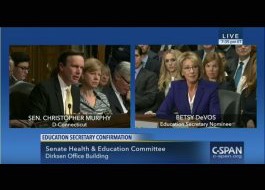
The Senate confirmation hearing for billionaire Republican donor Betsy DeVos kicks off on Tuesday, and is expected to include fierce questioning from Senate Democrats.
Postponed once amid concerns of an unfinished ethics review and incomplete financial disclosures, DeVos will likely face tough questions about her prior donations to sitting Republican senators and super PACs, and her previous comments that she expects a return on investments her family has provided in the form of political contributions.
DeVos, an advocate for alternatives to traditional public schooling, championed charter school and school voucher initiatives in her home state of Michigan, where she served as chairwoman of the Michigan Republican Party. She's expected to receive questioning on her vision for leadership of The Department of Education (ED).
The secretary of education, as the head of the ED, advises and executes legislation over education policy at both the K-12 and post-secondary level.
Created in 1979 under President Jimmy Carter, the ED is the smallest cabinet-level department. Its main functions include administering federal assistance to schools and enforcing federal education laws. The secretary of education is fifteenth in line for succession to the presidency.
It also provides funding to local school districts. The Title I program, for example, provides federal funding to schools with large numbers of low-income students.
This is likely to be a place where DeVos will receive some questioning as Trump pledged to invest $20 billion in school choice when president.
Trump's plan, unveiled in September, would reprioritize existing federal dollars to establish a school voucher grant program to allow children to attend whatever school they wanted. Trump argued that the voucher system would not only help impoverished children enroll at quality schools, but a free market would also improve the entire system.
Senators are expected to ask if this will harm the Title I program and school systems in need of funding.
The ED, through its sub-agency the Office for Civil Rights, also ensures that discrimination does not occur in schools based on race, gender, sexual orientation, and other characteristics.
 Current secretary of education John B. King. Thomson Reuters
Current secretary of education John B. King. Thomson Reuters
For example, the American Civil Liberties Union filed a federal discrimination complaint with the Department of Education on behalf of Gavin Grimm in 2016. Grimm, a transgender student, claims he was discriminated against by his school district, which will not allow him to use the bathroom that corresponds with his gender identity.
Some civil rights groups have worried what DeVos' prior donations to conservative groups, including a Christian organization called Focus on the Family, mean for LGBT and other minority students, The Chicago Tribune reported. She will likely receive questions over her conservative activism and what it means for the children in school systems she will oversee.
Lastly, one of the largest, and certainly the most costly, areas of responsibility for the ED is the administering of federal student aid. The Pell Grant program — student aid that does not need to be repaid — was the largest area of spending for the department for 2016 with about $22.5 billion spent.
In Michigan DeVos did not wade into issues of higher education, and she is the first choice for secretary of education without any substantial higher education experience.
This is an opportunity for senators to get DeVos on the record on where she stands on a number of higher education issues.




